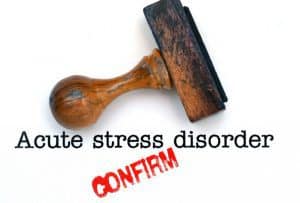ACUTE ANXIETY DISORDER DEFINITION
Acute anxiety disorder is characterized by the appearance of a set of anxiety symptoms that occur after exposure to a highly traumatic event. Anyone with this disorder fears life in general because of a constant state of anxiety.

The disturbances last for more than two days, up to a maximum of four weeks and are the first month since the traumatic event occurred. (If symptoms lasted more than four weeks, the diagnosis would be PTSD).
Similar to the stressor, which produces this disorder, post-traumatic stress disorder, is extremely serious. The most typical examples are:
– Accidents
– Natural disasters (earthquakes, floods, hurricanes…)
– Attacks
– The unexpected death of someone close
– Assaults, crimes or violations
– Sexual or physical abuse during childhood
– Abductions
The traumatic event usually is experienced again as images, dreams, thoughts, etc and the subject can end up feeling like they are reliving the events again.
SYMPTOMS
The most common symptoms of this disorder are:
– Derealization (feelings that the environment is unreal or strange)
– Dissociative Amnesia (there may be an inability to remember the traumatic event)
– Being stunned
– Exaggerated startle responses
– Motor restlessness
– Poor concentration
– Trouble sleeping
– Symptoms of hopelessness
– Behavior such as avoidance of places, people or activities, that recall the traumatic event.
COMPLICATIONS
There is a high probability that those affected by stress also develop a Post Traumatic Stress Disorder. Sleep disorders, depression, panic attacks (accompanied by tachycardia, sweating…) are also common, as well as social and occupational impairment.
TIPS TO OVERCOME ACUTE ANXIETY DISORDER
1. To overcome acute anxiety disorder, maintain a healthy life as normal as possible, with your daily routines and go back to work. Distract yourself.
2. It takes a balanced diet and good exercise regularly to overcome it. It will help you feel good about yourself and lessen acute anxiety disorder over time.
3. Talk about what happened and how you feel with someone you trust, but do not fall into obsession. Talk to unburden or to discuss your feelings, never as a means to revive it.
4. After suffering acute stress disorder, do not beat yourself up about it or repress your feelings.
5. Do relaxation exercises. You can think about yoga as a way to learn to breathe and relax.
6. Take caution when driving. It is also advisable to be careful in general because accidents may be more likely if you have a state of lower concentration.
7. As far as possible, go back to where it all happened. You will see that you will improve. Ask someone you trust to accompany you.
8. Spend more time with your family and friends, do not isolate yourself. Go out and have fun.
9. You should always hope that you’ll get better. Visualize well, negative thinking will only hurt you.
10. If you see no improvement or worsening of your thoughts, see a professional to orientate you and guide you in your process of improvement.
11. You’ll know you’ve passed through acute anxiety disorder when:
– You think about the event and you do not panic.
– You do not feel constantly threatened.
– You do not think about it at times that do not matter.
